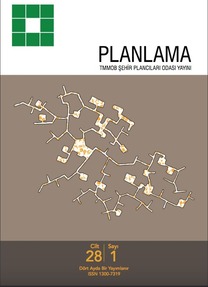Direnişçi Planlama: Gelişmekte Olan Ülkeler İçin Yeni Bir Planlama Kuramı
Insurgent Planning: A New Planning Theory for Developing Countries
___
- Beard, V. (2002). Covert planning for social transformation in Indonesia. Journal of Planning Education and Research, 22, 15-25. https://doi. org/10.1177/0739456X0202200102
- Brown, W. (2003). Neo-liberalism and the end of liberal democracy. Theory & Event, 7(1). https://doi.org/10.1353/tae.2003.0020
- Davidoff, P. (1965). Advocacy and pluralism in planning. Journal of the Amer- ican Institute of Planners, 31(4), 331-338.
- Ersoy, M. (2016). Kentsel planlama kuramları. İmge Kitabevi.
- Frantzman, S. J. (2014). The politization of history and the Negev Bedouin land claims: A review essay on indigenous (in)justice. Israel Studies, 19(1), 48-74. https://doi.org/10.2979/israelstudies.19.1.48
- Friedmann, J. (1987). Planning in the public domain: From knowledge to ac- tion. Princeton University Press.
- Healey, P. (1992), Planning through debate: The communicative turn in plan- ning theory. The Town Planning Review, 63(2), 143-162. https://doi. org/10.3828/tpr.63.2.422x602303814821
- Holston, J. (1998). Spaces of insurgent citizenship. L. Sandercock (Ed.), Making the invisible visible: Multicultural planning history içinde (37-56 ss.). Berkeley: University of California Press. https://doi. org/10.1525/9780520918573-004
- Meir, A. (2005). Bedouin, The Israeli State and insurgent planning: Global- ization, localization or glocalization? Cities, 22(3), 201-215. https://doi. org/10.1016/j.cities.2005.03.008
- Meth, P. (2010). Unsettling insurgency: Reflections on women’s insurgent practices in South Africa. Planning Theory & Practice, 11(2), 241-263. https://doi.org/10.1080/14649351003759714
- Miraftab, F. (2009). Insurgent planning: Situating radical planning in the Global South. Planning Theory, 8(1), 32-50. https://doi. org/10.1177/1473095208099297
- Miraftab, F., Wills, S. (2005). Insurgency and spaces of active citizenship: The story of Western Cape anti-eviction campaign in South Africa. Jour- nal of Planning Education and Research, 25(2), 200-217. https://doi. org/10.1177/0739456X05282182
- O’Brien, P. (2014). Insurgent planning and rural transformation: A compari- son of social movements in Venezuela and Brazil [Yüksek Lisans Tezi, The University of Guelph]. Erişim adresi: https://atrium.lib.uoguelph. ca/xmlui/handle/10214/8153
- Sletto, B., Muñoz, S., Strange, S.M., Donoso, R.E. (2010). El Rincón de los Olvidados: Participatory GIS, experiential learning and critical pedagogy in Santo Domingo, Dominican Republic. Journal of Latin American Ge- ography, 9(3), 111-135.
- Sletto, B. (2013). Insurgent planning and its interlocutors: Studio pedagogy as unsanctioned practice in Santo Domingo, Dominican Republic. Jour- nal of Planning Education and Research, 33(2), 228-240. https://doi. org/10.1177/0739456X12467375
- Sletto, B. (Ed.). (2016). Reimagining community infrastructures. The Univer- sity of Texas at Austin. Erişim adresi: https://sites.utexas.edu/santodo- mingo-informality/files/2019/07/Los-Platanitos-book-2016_Red-for- Web.pdf
- Sletto, B. (Ed.). (2017). Insurgent planning through critical pedagogies. The University of Texas at Austin. Erişim adresi: https://sites.utexas.edu/ santodomingo-informality/files/2019/07/DR2017-w-Cover_Red-for- Web.pdf
- White, B. (2012, Ekim 22). Israel: Ethnic cleansing in the Negev. Al Jazeera. https://www.aljazeera.com/opinions/2012/10/22/israel-ethnic-cleans- ing-in-the-negev
- Winsor, B. (2020, Ekim 9). ‘‘We want to be equal citizens’’: Meet the Bedouin Israelis fighting for their land and heritage. Jstreet. Erişim adresi: https:// jstreet.org/we-want-to-be-equal-citizens-meet-the-bedouin-israelis- fighting-for-their-their-land-and-heritage-regional-council-of-unrecog- nized-villages-in-the-negev-israel-rcuv/#.YYLOEtZBy3I
- Yahel, H. (2021). The Negev Bedouin as a de-legitimization tool. Israel Af- fairs. 27(1), 121-143. https://doi.org/10.1080/13537121.2021.18648 53
- Yalçıntan, M.C. (2006, 7 Aralık). İnsana/öze dönüş: Radikal planlama. Arki- tera. Erişim adresi: https://v3.arkitera.com/k147-insana-oze-donus- radikal-planlama.html
- ISSN: 1300-7319
- Yayın Aralığı: Yılda 3 Sayı
- Başlangıç: 1986
- Yayıncı: TMMOB Şehir Plancıları Odası
Kentsel Güvenliğin Sağlanmasında Tasarım Rehberleri
Nilgün Çolpan Erkan, Tuba Koca
1999 Depremlerinin Ardından Planlama Mevzuatı Üzerine Bir Değerlendirme
Kadıköy Örneğinde Alternatif Tiyatro Sahnelerinin Kamusallık Bağlamında Kamusal Mekân ile Etkileşimi
Ebru Firidin Özgür, Devran Bengü
Neslihan Karataş, Mehmet Ali Kaya
Kentsel Mekanın Değişimi ve Gelişme Döngüleri; Eski Keresteciler Çarşısı (İzmir) Örneği
Yok Olan Spor Yapılarının Ardından Kentte Yıkma Eylemi ve Bellek: Trabzon Örneği
Şengül Yalçınkaya, Ümran Sofuoğlu
Türkiye’nin Otopark Politikasında Paradigma Değişimi İçin İki Öneri
Emine Yetişkul Şenbil, Metin Şenbil
Kentsel Mekanın Sosyallik Durumları Üzerine Biçim Odaklı Bir Bakış
Direnişçi Planlama: Gelişmekte Olan Ülkeler İçin Yeni Bir Planlama Kuramı
